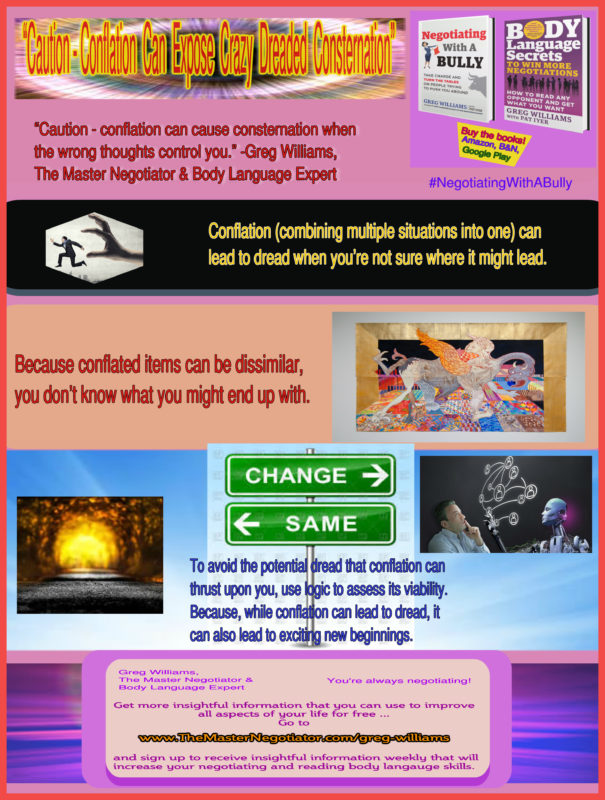Caution: Conflation Can Expose Crazy Dreaded Consternation
Caution: Conflation Can Expose Crazy Dreaded Consternation https://csuiteold.c-suitenetwork.com/advisors/wp-content/themes/csadvisore/images/empty/thumbnail.jpg 150 150 Greg Williams, MN, CSP https://secure.gravatar.com/avatar/1f08a50bcaed92eae0990a65c7808a62?s=96&d=mm&r=g
“Caution – conflation can cause consternation when the wrong thoughts control you.” -Greg Williams, The Master Negotiator & Body Language Expert
Was she confused? She didn’t know if she was conflating dissimilar occurrences or becoming consumed by #caution. #Conflation can do that she thought – cause your mind to accept dissimilar occurrences as being similar – even when logic dictates otherwise. She realized her perceived dilemma was leading to #consternation. And that was something that she didn’t want to deal with.
The Situation:
She posted her article in the usual manner. But it didn’t populate automatically as it usually did. Then, a message that should have gone to her special list didn’t occur – now what, she wondered. Those processes are on different platforms – that can’t be related, or can it? She felt a sense of foreboding wailing inside of her as she questioned herself as to whether she was conflating two situations that were independent of one another.
The Problem:
Sometimes we conflate dissimilar events and situations and begin to see them as one combined occurrence. You’ve more than likely heard that “things come in threes” – and that’s usually associated with negativity. So, why do we do it? Why do we subject ourselves to crazy thoughts that causes dread – that cause us consternation? In part, that’s due to what we’re focusing on and what we expect to see.
Consider this – if we weren’t looking for the “things come in threes” scenario, we wouldn’t spot the second iteration of the first thing in that occurrence. Thus, the third occurrence would never have life. We can really drive ourselves crazy assembling disjointed occurrences into a seemingly logical progression – especially when logic screams at us about their mismatch. You and I need to be cautious as soon as we start down that path – it can lead to crazy dreaded consternation.
The Solution:
First, when you’re thinking with a mindset that defies logic, think about the way you’re thinking. Continuing along your current path of reasoning can make things get worse before they become even worse. Stop your crazy thinking before it stops you. To do that, note:
- Conflation isn’t bad. Your appeal can be summoned by a combination of good and bad thoughts that appear to be dissimilar. That doesn’t necessarily mean there’s harm in them. Both negative and positive conflation can be a plus. To assess when it is, note how it serves your goals. If it does, consider progressing your thoughts along the lines that you’re engaged in. If they’re not serving you, stop!
- Recognize the ‘headspace’ you’re in. Since your environment influences your thoughts, and impact your actions, take into consideration the environments you’re in – do so while considering the ones that you’ve been in recently. We’ve all heard about misplaced aggression due to situational occurrences that happened in another environment. To that end, even consider thoughts that aren’t prominent in your mind – silent thoughts can be like a vanishing ghost that wreaks havoc and then disappears back into nothingness.
- Question if you’re on a slippery slope. One line of thinking will naturally extend to the next thread in the string – if you fail to monitor it. When you sense you’re being filled with despair, question what scenarios you’re conflating. Ask yourself if they really belong in the same thread. To assess that possibility, listen to logic – it can be a strong arbiter for why you should adopt one belief over another.
What does this have to do with negotiations?
You may become consumed by crazy thoughts in a negotiation. Those thoughts may cause you consternation. Unless checked, you may find yourself mired by despair – wondering how you got there and how you’ll free yourself. During such times, you run the risk of being illogical, which will cause your negotiation abilities to wane. To prevent that from occurring, be mindful of your emotions. Understand what’s motivating you to think the way you’re thinking. And realize, if you’re not thinking right, the right things won’t occur.
The point is, you must isolate yourself from conflation when it doesn’t serve you and embrace it when it does. To know the difference, you must know what’s driving your thoughts and recognize where those thoughts are taking you. Then, and only then, will you have control over your thinking … and everything will be right with the world.
Remember, you’re always negotiating!
Listen to Greg’s podcast at https://anchor.fm/themasternegotiator
After reading this article, what are you thinking? I’d really like to know. Reach me at Greg@TheMasterNegotiator.com
To receive Greg’s free “Negotiation Tip of the Week” and the “Sunday Negotiation Insight” click here http://www.themasternegotiator.com/greg-williams/
#Negotiate #Process #Power #Powerful #Emotion #Business #Progress #SmallBusiness #Negotiation #NegotiatingWithABully #Power #Perception #emotionalcontrol #relationships #HowToNegotiateBetter #CSuite #TheMasterNegotiator #ControlEmotions

